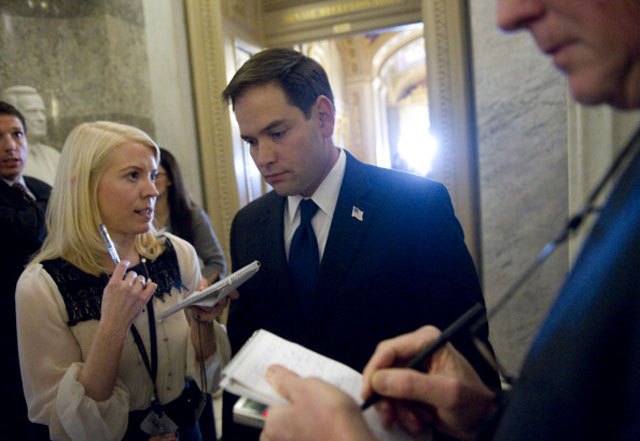The Latino legislators who voted in favor of a compromise to avert a fiscal cliff – mostly Democrats but including some Latino Republicans such as Florida’s Congressman Mario Diaz-Balart and Congresswoman Ileana Ros-Lehtinen – said they did it to ensure taxes would not increase on working to middle-income families.
“While this bill has its flaws, it immediately and permanently cuts taxes on 98 percent of the American people and 97 percent of small businesses,” stated Republican Congressman Mario Diaz-Balart, who was in the minority of Republicans who voted “yes” to the legislation. Outgoing Texas Democratic Congressman Charles Gonzalez, who is also the outgoing Chair of the Congressional Hispanic Caucus (CHC), voted in favor of the legislation, as did most Latino Democrats. ”President Obama has kept his promise to protect the most vulnerable American families from further economic hardship,” said CHC Chair Gonzalez, who also praised the fact that the compromise preserved emergency unemployment insurance for 2 million households.
“The fiscal cliff agreement received significant support from both Democrats and Republicans, hopefully a sign of better things to come in the next Congress,” said California Democratic Congresswoman Loretta Sanchez, who also voted in favor of the deal.
The compromise “fiscal cliff” vote – which was eked out at the last possible minute before a series of tax cuts would have automatically ended – keeps the Bush-era tax cuts for most Americans except those making more than $400,000 dollars or families making more than $450,000 annually. It also extends unemployment insurance and tax credits for working families as well lower and middle income families with children in college.
“We applaud the White House and Congress for working together to deliver a fair approach to reducing our deficit that doesn’t come at the expense of vulnerable, working and middle-class families,” said National Council of La Raza’s Janet Murguia, who supported the legislation. Murguia also added the tax plan “is a strong first step toward ensuring that the burden of deficit reduction is shared more fairly, without jeopardizing the health of our economy and the financial security of Latinos and other vulnerable communities.”
Not everyone agrees, however. Most Republican Latino legislators, like Florida RepublicanSenator Marco Rubio, voted against it.
“Of course, many Americans will be relieved in the short term that their taxes won’t go up,” said Senator Rubio in a statement, staying true to his Tea Party roots, which opposes any tax increases. ”However in the long run, they will be hurt when employers pass on to them one of the largest tax hikes in decades. Furthermore, this deal just postpones the inevitable, the need to solve our growing debt crisis and help the 23 million Americans who can’t find the work they need,” said Rubio.
Rubio’s action drew praise from conservative Latinos such as political blogger Javier Manjarres, of The Shark Tank. ”Rubio and his ‘gang of eight’ need to be commended from ‘bucking’ his squishy established Republican leadership in the Senate, after they bowed down to President Obama and compromising principles, again,” wrote Manjarres. Daniel Garza, of the Libre Initiative, which advocates for less government spending, stated recently that “by refusing to recognize that the real fiscal cliff is our sky-high national debt and the pending entitlement crisis, the real losers are future generations of Americans who will be forced to endure a fiscal reckoning in just a few short years,” Garza said.
“Rubio is clearly trying to stake out some presidential territory here; he wants to be able to say he did not vote for any tax increases,” says University of Washington political scientist Matt Barreto, who explains that while this may appeal to very conservative voters, it can backfire among most Latino voters as well as many general election voters. “We found most Latino voters we polled wanted Congress to work out a compromise,” says Barreto. He also adds that Mitt Romney’s “hard tack to the right” in the primaries backfired, and the same thing could happen to Rubio with Latino voters if there is a continued “disconnect” between the Florida Republican Senator and many voters.
California Democratic Congressman Xavier Becerra, who is on the influential House Ways and Means Committee, which formulates tax law, voted against it. Becerra, who is also the Vice Chair of the House Democratic Caucus, said the legislation did not do enough to ensure more job creation while dealing with the longer-term challenge of the deficit. Becerra said House Republicans had “walked away” from the negotiating table until the last minute, leaving this “last-minute agreement on taxes.”
“In the end, I could not support this short-term fix which may spawn additional long-term problems, putting off until later the tough decisions on taxes and our nation’s debt and deficits, while also ignoring the biggest deficit challenging America’s prosperity: a jobs deficit,” said Congressman Becerra.
While Becerra’s politics are more consistent with Latino voters, who favor a combination of tax increases on wealthier families along with debt reduction, Barreto says there is a risk for Becerra too as he voted against the majority of his party. ”While Becerra is in a safe district and his politics are more consistent with Latino voters, he still could be tainted as someone who failed to go along with a compromise that was led by Vice President Biden and many of the Democrats.” by Sandra Lilley [NBC]


